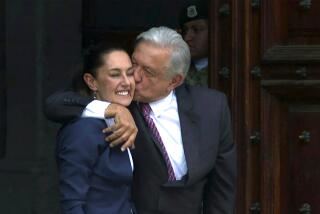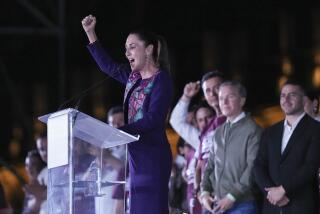Dissident Quits Mexico’s Ruling Party : Politics: The defection of Rodolfo Gonzalez Guevara is likely to ignite divisive debates within the PRI. He charges the group has become undemocratic.
- Share via
MEXICO CITY — The Institutional Revolutionary Party’s most outspoken dissident has resigned, asserting that a national assembly held this month was “a masquerade” that proved the ruling party is undemocratic and unwilling to separate from the government.
Rodolfo Gonzalez Guevara’s resignation is the biggest blow to the PRI, as the party is called, since leftist leader Cuauhtemoc Cardenas quit in October, 1987, to run as an opposition candidate for the presidency.
A former secretary general of the PRI and member of the party for 44 years, Gonzalez Guevara spearheaded the dissident faction known as Critical Current, which has been pushing for an internal democratization, honest elections and a separation of party and state.
Gonzalez Guevara’s resignation is not likely to provoke a mass exodus from the PRI, but it will produce painful and, most likely, divisive debates within the party. Together with the departure of the “Cardenistas,” it gives the impression that there is no room for true dissent within the PRI.
Gonzalez Guevara’s resignation also is a setback for President Carlos Salinas de Gortari, who has vowed to bring about democratic reforms in Mexican politics but who issued a scathing attack on his critics during the PRI’s 14th party convention, which ended Sept. 3.
Gonzalez Guevara has been critical of Salinas’ neo-liberal economic program, a radical departure from the original philosophy of the party that grew out of the Mexican Revolution and has ruled for 61 years.
Salinas has pared down the Mexican state and sold off government companies. His economic austerity program has eaten away at workers’ salaries, and he has allied his government closely with the United States.
In his resignation letter, made public Thursday, Gonzalez Guevara said he was committed to “the ideas of the Mexican Revolution” and an independent party. He had been pushing for the party to switch from an organization based on tightly controlled sectors--labor, farmers and bureaucrats--to one based on geographic representation with secret elections for party posts.
Most PRI leaders reacted to his resignation respectfully and with regret. But Fidel Velazquez, the 90-year-old patriarch of the PRI’s Mexican Workers’ Confederation, one of the three party sectors, lashed out at him.
“When you cut a dead branch from a tree, the tree is better off,” Velazquez said. Gonzalez Guevara responded in a radio interview that Velazquez has been “the principal cause of anti-democracy in the party.”
At the party convention, Velazquez’s labor sector managed to stave off reforms that would have reduced its power and the muscle of all sectors.
Gonzalez Guevara has been an undersecretary of interior; head of the ruling party’s think tank, the Center for Social, Political and Economic Studies, and twice a member of the Chamber of Deputies, the lower house of the National Congress. As Mexico’s ambassador to Spain from 1984 to 1987, he joined Cardenas in forming the first dissident faction within the PRI, the Democratic Current.
During the party convention in February, 1987, then-PRI chief Jorge de la Vega Dominguez announced that the party did not accept “internal currents,” which he likened to a fifth column. After that, Cardenas withdrew from all party duties, and he resigned in October, when a tiny opposition party offered to back him for the presidency.
Cardenas has since formed his own party, the Democratic Revolutionary Party.
Gonzalez Guevara, who chose not to leave the party with Cardenas in 1987, formed the Critical Current soon thereafter. He wrote many controversial articles in the Mexico City daily newspaper, Excelsior, accusing the government of election fraud and pushing for change within the PRI.
Gonzalez Guevara does not rule out the possibility of joining forces with Cardenas, but he said he would not enlist in any party right now. He also said he was considering forming his own party for the 1994 presidential election, a move that likely would hurt Cardenas as much as the PRI.
More to Read
Sign up for Essential California
The most important California stories and recommendations in your inbox every morning.
You may occasionally receive promotional content from the Los Angeles Times.













